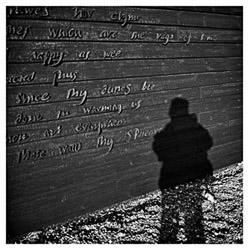Photography content = zero
I've just finished reading Thomas Pynchon's latest novel, Inherent Vice. It's actually a nice, quick, light read - like having a scoop of melon sorbet after the four-course banquet of hulking great metanarratives like his previous one, Against the Day (which I'm now reading for the second time and having a whale of a time with).
Anyway, what I've been finding interesting is Pynchon seeming to break his cover a little bit more these days. First it became known that he personally wrote the Amazon blurb for Against the Day, and now he's actually narrating promo videos like the one above. Of course the strangeness of this is kept in perspective by his - and, yes, that is really Pynchon - appearance on The Simpsons:
Two things about this really. Firstly, although - yes - I was fascinated to hear Pynchon's voice, I don't particuarly WANT to know anything about him. These days it's de rigeur for authors, artists, directors to do endless interviews - and I do think sometimes it becomes an intrusion on your experience of books, art, films &c to have this authorial presence looming over the whole thing. To be topical for a moment, does it affect your appreciation of a Polanski film to know that the person who made it went on the lam after molesting a child? In contrast, when I first read Gravity's Rainbow it might as well have dropped from the sky, and I was able to enjoy it wholly as a thing in itself (and, later, as part of a body of work) because the author was, at most, a spectral figure on the margins. I don't think it would have added anything to my experience to know what ol' Tom dresses like, who he votes for, whether he likes Mexican food, or anything at all about his personal life. Maybe the puppeteer should remain behind the curtain.
The second thing is really about people who are very concerned with the opposite of that last point. There are a few articles and films around that - rather creepily - are obsessed with Finding Pynchon. As if he was lost somehow, rather than just someone who doesn't like to do interviews very much. And so, in the absence of an external way of gauging the author's intent you end up with people earnestly suggesting that Pynchon IS JD Salinger, or - very popular at the time - that Pynchon IS the Unabomber.
Anyway, my point - to the extent that I have one - isn't that we should view art as totally abstracted from the people who make it, but just that if, say, you like my photographs it shouldn't perhaps matter too much if it turns out that I'm a jerk in real life...






0 Comments:
Post a Comment
<< Home